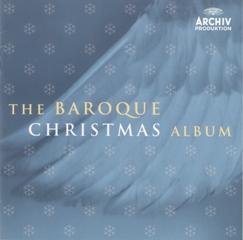The Baroque Christmas Album (2013)
The Baroque Christmas Album (2013)

Johann Sebastian Bach (1685 - 1750) "Nun komm, der Heiden Heiland", BWV 62 01. Chorus "Nun komm, der Heiden Heiland" (Choir) Marc-Antoine Charpentier (1634 - 1704) 02 - 05. Noëls sur les instruments, H 531, 534 Giovanni Gabrieli 06. Audite principes a 16, C 123 Marc-Antoine Charpentier (1634 - 1704) 07. In nativitatem Domini canticum, H. 416 - Nuit 08 - 09. Messe de Minuit, H. 9 Giovanni Gabrieli 10. Salvator noster a 15, C 80 11. O Jesu mi dulcissime a 8, C 56 Heinrich Schütz (1585 - 1672) 12. Historia der Geburt Jesu Christi, SWV435 (1664) 13. O bone Jesu, fili Mariae (SWV 471) Arcangelo Corelli (1653 - 1713) Concerto grosso in G minor, Op.6, No.8 "fatto per la notte di Natale" 14. 6. Pastorale: Largo Michael Praetorius (1571 - 1621) 15. Puer natus in Bethlehem - Ein Kind geborn zu Bethlehem 16. Final hymn: "Puer nobis nascitur" - Musae Sioniae VI (1609) 17. Organ voluntary: "Nun lob mein Seel" 18. Recessional: "In dulci jubilo" - Polyhymnia caduceatrix (1619) Ensemble: English Baroque Soloists, Monteverdi Choir, English Concert, ... Conductor: John Eliot Gardiner, Trevor Pinnock, Paul McCreesh, Marc Minkowski
This compilation of re-issues, originally recorded in the 1990s and 2001 features music, by Bach, Charpentier, Gabrieli, Schütz, Corelli (the famous beloved "Pastorale") and Praetorius, all of it beautiful and just right for celebrating a festival of light, hope, worshipful praise, and jubilation. It is performed to perfection by several period vocal and instrumental groups, the latter tuned to various "authentic" pitches. Some of the pieces are excerpts from longer works, some are arrangements, such as four lovely French Christmas carols in an instrumental version by Charpentier, whose harmonic and contrapuntal complexity makes the simplicity of the melodies all the more touching. There are also two reconstructions by Paul McCreesh of Christmas services as they might have been heard during Gabrieli's lifetime at Saint Mark's in Venice and during Schütz's lifetime at the Dresden Hofkapelle. The program is arranged for utmost contrast between vocal and instrumental textures, speed, length, mood and character. Among the highlights are the devout, fervent, quite melancholy "O Jesu me dulcissime" by Gabrieli, who wrote for voices with the same luminous brilliance as for brasses, and Praetorius' "In dulce jubilo," which, with fanfares of trumpets and drums, makes a fittingly triumphant, glorious ending. --Edith Eisler, amazon.com
download (mp3 @320 kbs):
uploaded yandex 4shared mega solidfiles zalivalka cloudmailru filecloudio oboom uplea








